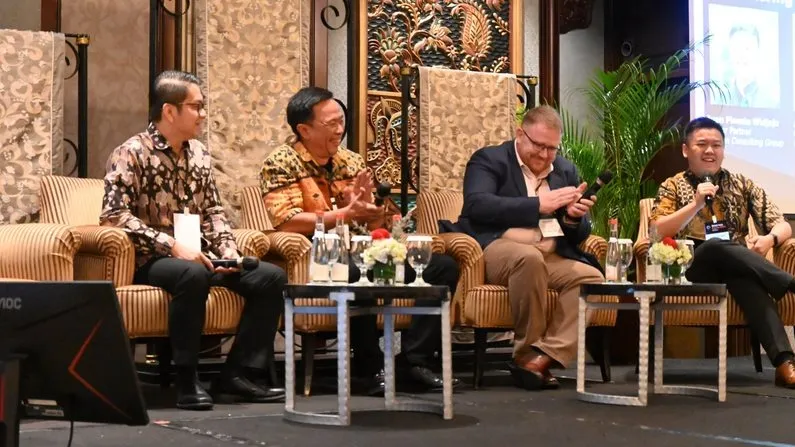
Embracing hyperlocal retailing in Indonesia
Retail Asia Forum in Jakarta delved on the complexities of implementing hyperlocal retail strategies in a country as diverse as Indonesia.
FOR a consumer market as diverse as Indonesia, a nation of over 275 million, hyperlocal retailing requires significant focus going into the future. That is exactly what some retail industry leaders came together to discuss at the Retail Asia Forum 2024 held on 16 May at Shangri La Jakarta.
The panel was composed of Anthony McEvoy, CEO of PT Sari Coffee Indonesia (Starbucks Indonesia); Andy Sumual, president director and CEO of FreshMart; and Fernando Repi, vice chairman of the Indonesia Retail Merchants Association (APRINDO).
Moderated by Juan Pisente Widjaja, senior partner at Gideon Consulting Group, the spritely exchanges focused on hyperlocal retail strategies, the challenges of expanding in Indonesia, and the impact of digital technology on the retail sector.
For all of them, certain commonalities they face around these topics are local sourcing, community engagement, and adaptation to diverse regional cultures. They also addressed competition, digital infrastructure hurdles, and the potential for Indonesian brands to go global.
Starbucks’ McEvoy spoke from the heart of his brand’s long-standing relationship with Indonesia. “We’ve been in retail in Indonesia for 22 years and have grown to become an integral part of the community here,” he asserted.
One key point of this relationship, according to McEvoy, is that Starbucks sources 70% of all Arabica coffee produced in Indonesia, from regions like Sumatra, Central Java, Toraja, and Papua. This exemplifies the brand’s deep-rooted connection with the country.
“Our approach to hyperlocal retail involves sourcing most of our products locally, from store fixtures to food ingredients, while maintaining our universal brand values centred around community and connection,” McEvoy added.
In this approach, he underscored the importance of creating a “third place” — a space for socialising and building community, which is a universal value that transcends geographical boundaries.
Diverse degions
On his turn, merchants association leader Repi addressed the complexities of implementing hyperlocal retail strategies in a country as diverse as Indonesia.
“APRINDO operates in 28 cities across Indonesia, each with unique cultural and logistical challenges,” he said. Because of this, there is the necessity for offline retailers to adapt to local content and create community-focused initiatives.
Repi shared as an example the approach during his tenure at Hypermart, where stores sourced fresh, local products and engaged in community activities such as educational visits for school children. “These efforts help build a loyal customer base and integrate the store into the local culture,” he said.
He also stressed the importance of supporting local festivities and incorporating regional languages and customs into marketing strategies to enhance local relevance.
Approach to localization
FreshMart’s journey and their commitment to localizing their operations is another interesting story. “We’ve been in business for 22 years, just like Starbucks, but our approach has been deeply rooted in our local community from the start,” Sumual said.
FreshMart’s tagline is in the local Menado language, and Sumual said they prioritise hiring and training local staff, many of whom have risen through the ranks from entry-level positions.
He said this is all part of FreshMart’s customer-centric approach, which includes campaigns like its loyalty programme where customers receive a cake on their birthday — another gesture that fosters strong community ties.
From workers, to customers, Freshmart ties up its entire ecosystem by tapping local suppliers, too. “Our suppliers are also integral to our business model. We work closely with them to ensure mutual growth and success,” Sumual said.
Navigating competition
When asked about competition from local coffee brands, McEvoy responded: “We welcome the growth of local coffee brands. It drives us to be better and caters to different market segments.” He noted that Starbucks’ strategy focuses on providing a unique in-store experience, with larger spaces and amenities like high-speed Wi-Fi, which differentiates them from smaller local competitors.
Sumual addressed the digital divide, acknowledging that infrastructure in regions outside Java, such as network connectivity and reliable electricity, poses challenges. “We collaborate with local technology providers and even use radio communication as a backup to ensure continuous service,” he said. This adaptability is crucial for maintaining operations and customer satisfaction in less developed areas.
Expanding brands
The final question thrown to the panel was directed at Repi and focused on the potential for Indonesian brands to expand internationally.
Repi, being the chair of the Asia Pacific Retail Association, said he believes in the significant potential for Indonesian retail brands to thrive abroad. “Brands like Alfamart have already made strides by opening nearly 1,000 stores in the Philippines,” he noted.
He also emphasised the need for government support to facilitate international expansion and the importance of building strong local brands first.
“Indonesian brands have unique strengths and characteristics that can appeal to global markets. It's about leveraging these unique selling points and getting the right support to scale,” Repi said.

















 Advertise
Advertise







